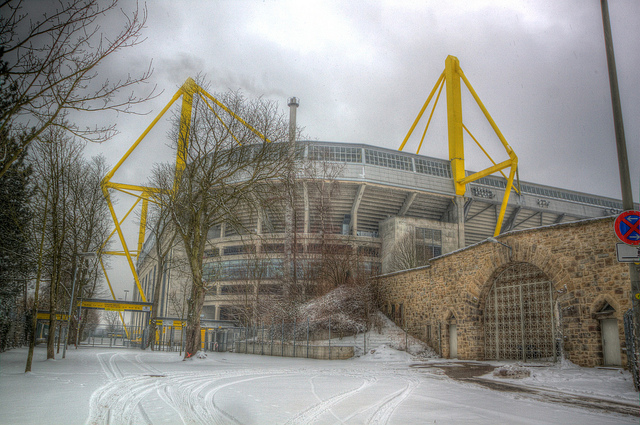
A fascinating article from Bloomberg today describes Borussia Dortmund’s apparent multi-million euro deal that will see them be paid for not qualifying for the Champions League.
According to the article, by Alex Duff and Sarah Jones, the German team has had an insurance contract in each of the three seasons since their 2012 Bundesliga title which covers it against losses to potential revenue from failing to qualify for the Champions League. Should this happen, the insurance company pays to the team to compensate them for the loss of income they would have received.
Such contracts are banned in the UK for obvious reasons. The whole point of prize money is to incentivise clubs to compete and do the best they can. That incentive is undermined if the club manages to get money even if it loses out on the pitch. What might be a sensible hedging strategy in other circumstances might become a disincentive to success.
Team performance
The deal is particularly interesting given Dortmund’s current struggles. The team finished 2nd in the Bundesliga in 2012-13 and 2013-14, qualifying for the Champions League each time and finishing runners-up in 2012-13. The club got €37.4m for reaching the quarter finals of the Champion’s league last year.
This year, however, the team suffered a surprising collapse in form and have languished for much of the year at the bottom of the table and are now 9th. There are all too many results for a search on “What went wrong for Borussia Dortmund?” It is impossible for the team to qualify for the Champions League, and so presumably the insurance contract will pay out.
Insurance implications
Bloomberg says that the club have bought insurance for the last three years. They also quote sources that Dortmund will be paying a premium of around 30%.
The premium is a percentage of the value insured against. So if the club was insured against losing €30m they would pay the insurance company around €10m. If the club fails to qualify in 2 out of three years the club ends up making money (and the insurance company would probably stop insuring them).
Every three years the club will pay in insurance premiums 90% or so of the amount it is insured for, implying a small gain if it were to fail to qualify once every three years. If the club qualifies every year it will pay out more in insurance premiums than it is insured against, losing money on the insurance contract but of course benefiting from larger, ongoing success payments.
If Dortmund had done better this season, they would have started to lose money on the insurance contract over the three years. By failing to qualify, they end up making the money back they have paid out in premia; but of course by qualifying, they would have won a similar or larger amount (the details of the contract are not certain).
Integrity risk?
Of course we are not saying Dortmund deliberately performed badly in order to get an insurance payout. But could the contract have changed some incentives at some point?
The contract apparently stipulates that the playing staff cannot be informed of the contracts, but the mere existence of these contracts cannot be seen as a good practice for promoting sports integrity - both perceived and real.
Here’s a small one. The contract is apparently invalidated if the club sell three big players, or lose their hitherto highly-regarded manager during the season. Could this be why Dortmund has only sold two players this season for a total of €4.2m, despite great interest in players like Mats Hummels, who may be worth less if sold in the summer?
And could it by why the manager Jurgen Klopp has announced he will leave at the end of the season? At the time he announced he was leaving he said he was no longer the right man for the job. He had not had any other offers from other clubs, it was just time to go. Football clubs are not usually known for keeping on poorly performing managers who admit they are not right for the job…
Wider issues
How big is the market in clubs insuring against failure - or, equivalently, betting against success? We don’t know. It seems nobody does.
How transparent is the market? How many other clubs have similar bets out?
How much of the market is with companies that are subsidiaries of bookmakers, and are there any implications for the implied inside information that clubs may be covered in the event of a sporting failure? Should gamblers be aware of that information?
And what about fans? Are these bets just good financial management - or do they risk giving clubs different incentives from the pure desire to win of their fans?
Do the football authorities require, at least, that such contracts be recorded with them? Are there, in fact, any related measures to support integrity of results?
Picture credit - “The Temple” by Christian. Creative Commons Licence
